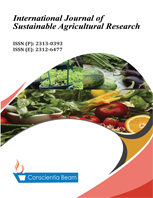Evaluation of performance and yield of modern wheat cultivars through foliar nutrition strategies for sustainable agricultural development
DOI:
https://doi.org/10.18488/ijsar.v11i4.4008Abstract
This research investigates the evaluation of performance and yield of modern wheat cultivars through foliar nutrition strategies for sustainable agricultural development. The research. This research, conducted from November 2022 to March 2023 at the University of Rajshahi, evaluated the impact of reduced fertilizer through foliar feeding on two advanced wheat cultivars using a randomized complete block design with five treatments: T1 (control), T2 (1500 ml liquid fertilizer per hectare), T3 (2500 ml liquid fertilizer per hectare), T4 (1500 ml liquid fertilizer with 2.5 kg urea per hectare as spray), and T5 (1500 ml liquid fertilizer with 2.5 kg urea and 1.5 kg muriate of potash per hectare as spray). The study found that the highest plant height (97.86 cm), chlorophyll content (48.20 mg m-2), and yield attributes, including plant height (99.36 cm), total tillers per plant (8.057), productive tillers per plant (5.000), productive spikelets per spike (18.610), spike length (15.777 cm), 1000 grain yield (41.183 g), grain yield (3.247 t ha-1), straw yield (7.738 t ha-1), biological yield (10.985 t ha-1), and harvest index (29.558%), were achieved with T5. The study aimed to assess the efficacy of modern wheat varieties under reduced fertilizer conditions, highlighting the potential for sustainable wheat fertilizer management, particularly under drought conditions.

